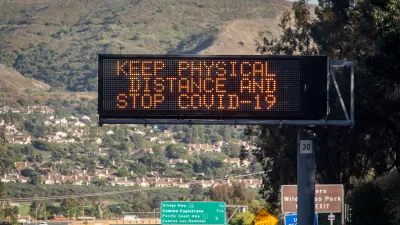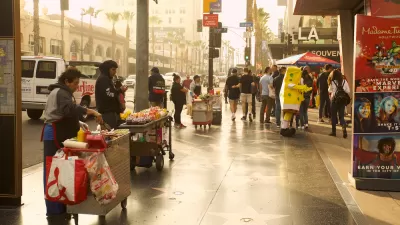Kerwin Datu suggests that transit in cities of the future should no longer be organized around a distinct center. "Rather than think of a city as a centre surrounded by suburbs, think of it as a patchwork of specialised districts woven together."
Datu asks "what is the center?" Often it is a historical, commercial or financial district but he pointedly argues that there is no need for either of these to be "at the centre of a large city, nor in the same place, and it would make for better planning if we abandoned the myth of the city centre altogether."
He argues that the importance of the city center around the world is more often than not the result of a self-fulfilling prophecy. Most older city centers have been subject to an upward spiral of infrastructure investment which has fortified their hollow pre-eminence within the metropolis.
Datu states that rather than reduce congestion, increased public transport merely increases a city's commuting capacity, most often with an intense centralizing effect.
"Large cities today need to be planned not in concentric circles, but as tapestries. We still need differing degrees of intensity across urban areas, but these should be planned as an orderly modulation of intensity throughout the metropolis."
FULL STORY: A City Doesn't Need A Center! (But It Does Need Realistic Planning)

Alabama: Trump Terminates Settlements for Black Communities Harmed By Raw Sewage
Trump deemed the landmark civil rights agreement “illegal DEI and environmental justice policy.”

Planetizen Federal Action Tracker
A weekly monitor of how Trump’s orders and actions are impacting planners and planning in America.

The 120 Year Old Tiny Home Villages That Sheltered San Francisco’s Earthquake Refugees
More than a century ago, San Francisco mobilized to house thousands of residents displaced by the 1906 earthquake. Could their strategy offer a model for the present?

In Both Crashes and Crime, Public Transportation is Far Safer than Driving
Contrary to popular assumptions, public transportation has far lower crash and crime rates than automobile travel. For safer communities, improve and encourage transit travel.

Report: Zoning Reforms Should Complement Nashville’s Ambitious Transit Plan
Without reform, restrictive zoning codes will limit the impact of the city’s planned transit expansion and could exclude some of the residents who depend on transit the most.

Judge Orders Release of Frozen IRA, IIJA Funding
The decision is a victory for environmental groups who charged that freezing funds for critical infrastructure and disaster response programs caused “real and irreparable harm” to communities.
Urban Design for Planners 1: Software Tools
This six-course series explores essential urban design concepts using open source software and equips planners with the tools they need to participate fully in the urban design process.
Planning for Universal Design
Learn the tools for implementing Universal Design in planning regulations.
Clanton & Associates, Inc.
Jessamine County Fiscal Court
Institute for Housing and Urban Development Studies (IHS)
City of Grandview
Harvard GSD Executive Education
Toledo-Lucas County Plan Commissions
Salt Lake City
NYU Wagner Graduate School of Public Service





























